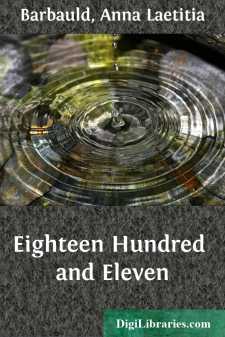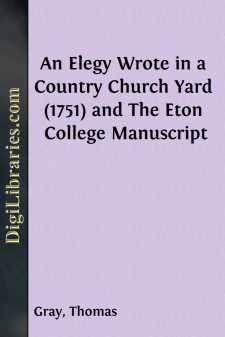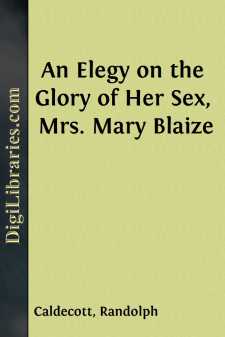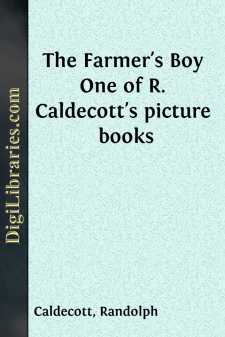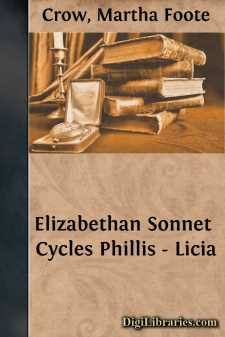Poetry Books
Sort by:
by:
John Louis Haney
INTRODUCTION To the modern reader, with an abundance of periodicals of all sorts and upon all subjects at hand, it seems hardly possible that this wealth of ephemeral literature was virtually developed within the past two centuries. It offers such a rational means for the dissemination of the latest scientific and literary news that the mind undeceived by facts would naturally place the origin of the...
more...
EIGHTEEN HUNDRED AND ELEVEN. Still the loud death drum, thundering from afar,O'er the vext nations pours the storm of war:To the stern call still Britain bends her ear,Feeds the fierce strife, the alternate hope and fear;Bravely, though vainly, dares to strive with Fate,And seeks by turns to prop each sinking state.Colossal Power with overwhelming force [2]Bears down each fort of Freedom in its...
more...
PREFACE. Sæmund, son of Sigfus, the reputed collector of the poems bearing his name, which is sometimes also called the Elder, and the Poetic, Edda, was of a highly distinguished family, being descended in a direct line from King Harald Hildetonn. He was born at Oddi, his paternal dwelling in the south of Iceland, between the years 1054 and 1057, or about 50 years after the establishment by law of the...
more...
by:
Thomas Gray
To some the eighteenth-century definition of proper poetic matter is unacceptable; but to any who believe that true poetry may (if not "must") consist in "what oft was thought but ne'er so well expressed," Gray's "Churchyard" is a majestic achievement—perhaps (accepting the definition offered) the supreme achievement of its century. Its success, so the great critic...
more...
Good people all,with one accord,Lament forMadam Blaize,Who never wanteda good word—From thosewho spoke her praise. The needy seldom pass’d her door,And always found her kind;She freely lent to all the poor—Who lefta pledge behind. She strove the neighbourhood to pleaseWith manners wondrous winning;And never follow’d wicked ways—Unless when she was sinning.At church, in silks and satins...
more...
The Farmer's Boy.WhenI was a farmer, a Farmer's Boy, I used to keep my master's HORSES,WithaGee-wohere, and aGee-wothere, And here aGee, and there aGee, And everywhere aGee;Says I,My pretty lass, will you come to the banks of the Aire oh?WhenI was a farmer, a Farmer's Boy, I used to keep my master's LAMBS,WithaBaa-baahere, and...
more...
by:
Anonymous
INTRODUCTION. In presenting to the public the following translations of the Old English (Anglo-Saxon) poems, Elene, Judith, Athelstan, Byrhtnoth, and The Dream of the Rood, it is desirable to prefix a brief account of them for the information of the general reader. I. The Elene, or Helena, is a poem on the expedition of the Empress Helena, mother of Constantine the Great, the first Christian emperor,...
more...
INTRODUCTION The last decade of the sixteenth century was marked by an outburst of sonneteering. To devotees of the sonnet, who find in that poetic form the moat perfect vehicle that has ever been devised for the expression of a single importunate emotion, it will not seem strange that at the threshold of a literary period whose characteristic note is the most intense personality, the instinct of poets...
more...
The true story of the life of Michael Drayton might be told to, vindicate the poetic traditions of the olden time. A child-poet wandering in fay-haunted Arden, or listening to the harper that frequented the fireside of Polesworth Hall where the boy was a petted page, later the honoured almoner of the bounty of many patrons, one who "not unworthily," as Tofte said, "beareth the name of the...
more...
by:
Henry Constable
SAMUEL DANIEL Daniel's sonnet series has been by many regarded as the prototype of Shakespeare's. It is true that several of Daniel's themes are repeated in the cycle composed by the greater poet. The ideas of immortality in verse, the transitoriness of beauty, the assurances of truth, the humility and the woes of the lover, the pain of separation and the comfort of night thoughts, shape...
more...



